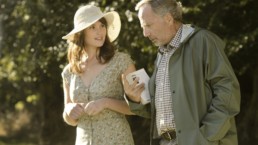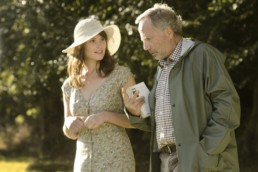Results: ‘Gemma Bovery’
Gemma Arterton stars in the poetically simplistic film adaptation of Posy Simmonds’ graphic novel, 'Gemma Bovery'.
The concept of art reflecting life is a very simple one to grasp, an artist is living and creates something that is influenced by their life. Simple. A more difficult idea to contemplate is the idea of life reflecting art, a more subjective perspective that relates different social understandings and the influence of the art surrounding the understanding.
Director Anne Fontaine attempts to rein in this abstraction in her film adaptation of Posy Simmonds’ graphic novel, Gemma Bovery. When an aged French baker (Fabrice Luchini) discovers his new neighbors (Gemma Arterton and Jason Flemyng) carry the same name and traits of famous writer Gustave Flaubert’s characters, Gemma and Charles Bovery, he becomes obsessed with this living and breathing manifestation of literary art. This sets him and the audience on a path of adultery, betrayal, and eventual death, all with the beautifully quaint, rural Norman village serving as a backdrop, in a way becoming more than just a setting.
Sometimes the beauty of the French countryside can be overwhelming and draw away from the focus of the storyline. Or on the other hand, it can be a shame if the cinematographer foregoes taking advantage of such an incredible setting. Cinematographer Christophe Beaucarne does an excellent job of establishing and using this idyllic setting without its beauty and romantic potency becoming too overwhelming. He maintains a subtly well-lit and poetically simplistic aesthetic that contrasts the living literature that it possesses to vibrant showey-ness of the modern world seen in Bovery’s contemporary fashion inclined friends, Wizzy and Rankin (Elsa Zylberstein and Pip Torrens).
While this basic theme of feminism is maintained, the film itself doesn’t carry the message as well as perhaps the graphic novel was able to.
Continuing to analyze the aesthetic, it is very clear that this film is not your typical graphic novel adaptation. There are no drastic angles and dramatized lines and shadows. The original illustrations of the Simmond’s work deal with soft lines and a semi-minimalist sketching style similar to Tin Tin or Calvin and Hobbes. The quirkiness that is associated with this style, however, seems to be lost in its translation to film. This is unfortunate as there are moments throughout the film, mostly in the middle hour, which could have benefitted from a little more quirkiness or humor. Despite superb performances from the entire cast, especially Luchini and Arterton, the film seems to drag on even with exciting plot points; for whatever reason, the film runs slow.
But the biggest criticism, as is with most adaptations, is its failure to reach its true potential. As the graphic novel is a feminist commentary, one would expect that the film is also a feminist film. Gemma Bovery is a complicated woman living her life and Martin Joubert (Luchini) is a foolish man, with a literary god-complex who, in his attempts to save Gemma from her impending doom, ends up killing the woman he has assigned himself the responsibility to protect. While this basic theme of feminism is maintained, the film itself doesn’t carry the message as well as, perhaps, the graphic novel was able to. The film is told from the perspective of Joubert, giving the audience a story seen solely from the male gaze, thus distorting a sense of truth that could have possibly been achieved with a third person narrative style and camera work. This is something that isn’t an issue in the particular graphic novel style because the drawings are often already in the third person.
Perhaps due to the film’s singular perspective, it becomes very difficult to connect with Gemma as she partakes in her adulterous relationships. Although one could argue the first incident was a result of incidentally strong influence from Joubert, Gemma becomes increasingly dislikeable and her choices become harder and harder to understand. She falls for men quickly and seems to float through her small French sexual wonderland just before her attempt at redemption. By the time she eventually shows signs of regret, it seems a little too late for viewers to really care about Gemma’s fate and that is never the end goal for a filmmaker’s title character. The film could have benefitted from a shorter runtime, but one thing’s for sure– this film is probably the cheapest way to enjoy the French countryside.
Gemma Bovery opens at The Landmark in West L.A., Pasadena Playhouse 7 in Pasadena, and Town Center 5 in Encino on Friday, May 29th.
Ryan Denman
Ryan is a contributing writer for CINEMACY.


